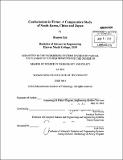| dc.contributor.advisor | Joel Moses. | en_US |
| dc.contributor.author | Liu, Benyue | en_US |
| dc.contributor.other | Massachusetts Institute of Technology. Technology and Policy Program. | en_US |
| dc.coverage.spatial | a-ko--- a-cc--- a-ja--- | en_US |
| dc.date.accessioned | 2012-09-13T19:00:32Z | |
| dc.date.available | 2012-09-13T19:00:32Z | |
| dc.date.copyright | 2012 | en_US |
| dc.date.issued | 2012 | en_US |
| dc.identifier.uri | http://hdl.handle.net/1721.1/72899 | |
| dc.description | Thesis (S.M. in Technology and Policy)-- Massachusetts Institute of Technology, Engineering Systems Division, Technology and Policy Program, 2012. | en_US |
| dc.description | Cataloged from PDF version of thesis. | en_US |
| dc.description | Includes bibliographical references (p. 105-110). | en_US |
| dc.description.abstract | Cultural differences not only affect the political arena, but also impact businesses around the world as more and more companies become multinational. The fast economic growth in East Asian countries has raised questions about whether there are unique cultural values benefiting business development in this region. As Confucianism is a shared ideological influence and its relationships with corporations and management have not been explored in depth, a comparative study is being conducted in this thesis on South .Korean, Chinese and Japanese firms, intending to find some similarities and differences which will shed light on the reinterpretation of Confucianism for modem commerce. While Japan and South Korea are further along the path of industrialization, these findings will be valuable for Chinese enterprises in the future. The main method for the thesis is to gather evidences that demonstrate connections between Confucian themes and firm characteristics by investigating the historical studies and references written in English. Results are summarized and the pros and cons of these Confucian-influenced firm characteristics are briefly discussed. We believe that the "Confucian" way of management brings more benefits than harm to the development of East Asian businesses at the initial stage of the business when the size of the business is small. When the business develops further and grows bigger, it is uncertain whether Confucianism brings more benefits than harm. A number of future research directions are suggested, as well as recommendations to future development of Confucian management in China. | en_US |
| dc.description.statementofresponsibility | by Benyue Liu. | en_US |
| dc.format.extent | 110 p. | en_US |
| dc.language.iso | eng | en_US |
| dc.publisher | Massachusetts Institute of Technology | en_US |
| dc.rights | M.I.T. theses are protected by
copyright. They may be viewed from this source for any purpose, but
reproduction or distribution in any format is prohibited without written
permission. See provided URL for inquiries about permission. | en_US |
| dc.rights.uri | http://dspace.mit.edu/handle/1721.1/7582 | en_US |
| dc.subject | Engineering Systems Division. | en_US |
| dc.subject | Technology and Policy Program. | en_US |
| dc.title | Confucianism in firms : a comparative study of South Korea, China and Japan | en_US |
| dc.type | Thesis | en_US |
| dc.description.degree | S.M.in Technology and Policy | en_US |
| dc.contributor.department | Massachusetts Institute of Technology. Engineering Systems Division | |
| dc.contributor.department | Technology and Policy Program | |
| dc.identifier.oclc | 808488181 | en_US |
